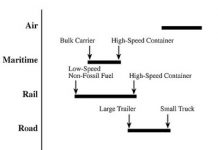by Debra Fiakas CFA
Last week Rentech, Inc. (RTK: NYSE) revealed plans to idle its wood pellet production facility in Wawa, Ontario Canada. To operate efficiently the plant requires additional repairs and upgrades beyond the replacement of conveyors that was completed in Fall 2016. Beside the fact that the additional repairs were not included in the regular capital budget, Rentech management has apparently determined the expenditure is not economic given profits from Wawa. When Rentech reports financial results for the fourth quarter ending December 2016, shareholders will be treated to an asset impairment charge for the Wawa facility.
Doors Close, Windows Open (then shut again)
The demise of Wawa is symptomatic of broader issues at Rentech, which has had to reinvent itself several times as the renewable energy industry has evolved. Rentech got its start well over a decade ago pursuing synthetic gas technologies. The company’s Rentech Process for producing synthetic fuel was thought capable of producing synthetic fuel by gasifying coal. In 2004, Rentech bought a natural-gas fed nitrogen fertilizer plant in East Dubuque, Illinois and laid out plans to convert it for coal feedstock. However, by October 2011, fuel projects in Rialto, California and Natchez had to be scrapped. The company had planned to produce drop-in synthetic fuel from landfill waste at Rialto using Rentech’s proprietary application of Fischer-Tropsch technology. Just a few months later in March 2012, Rentech abandoned its coal-to-liquid plant and later sold its land holdings in Natchez, Mississippi.
In March 2013, Rentech shuttered its product demonstration unit located in Commerce City, Colorado and terminated research and development on advanced biofuels. With the syngas effort behind it, Rentech quickly moved on other opportunities. In May 2013, the company acquired Fulghum Fibres, a processor wood fiber with 32 wood chipping mills strung out across the U.S. and South America. Rentech had its eye on the market for wood pellets to be used as a low-carbon alternative to coal feedstock in power generation plants. Unfortunately by 2015, the company was forced to begin writing down the value of its wood pellet inventory as the realizable fell under question under evolving demand and pricing conditions. Now those economic conditions have forced the shutdown of the Wawa wood pellet operation.
Retribution
Some of Rentech’s early strategic moves have eventually proved fortuitous. By 2011, all the company’s revenue was from sales of fertilizer products made from natural gas at the East Dubuque, Illinois facility. In November 2011, 39% of the fertilizer operation, the Rentech Nitrogen Partners, was sold through a public offering of its common units. The company received $276 million net of costs that was promptly used to retire term loan. Then in early April 2016, another fertilizer producer, CVR Partners (UAN: NYSE) acquired all the common units for $2.67 per share, retiring the units Rentech Nitrogen Partners from public trading. Rentech received $59.8 million in cash and 24.2 million CVR common units valued at approximately $142 million in the bargain. Again Rentech promptly distributed cash and some of the securities to repurchase $100 million in preferred stock and retire $41.7 million in debt obligations. Altogether Rentech received $477 million for its interests in Rentech Nitrogen Partners. Considering that the company paid $63 million for the business in 2004, the returns have been impressive.
After all the deal making, acquisitions and divestitures, at the end of September 2016, the last balance sheet disclosed by the company, Rentech had total equity of $278.1 million. The company has taken in $533.2 million in equity altogether, but losses over the years have accumulated to $255.1 million. The company has used leverage over the years, but long-term debt has been reduced to $125.9 million. The debt-to-equity ratio is now a relatively placid 0.45.
While Rentech has improved its balance sheet, its assets appear to go underutilized. Return on assets and return on equity are both negative based on recent financial performance. The net loss was $127.7 million or $10.42 per share on $287 million in total wood pellet sales in the twelve months ending September 2016. Even excluding discontinued operations, net results were negative. Indeed, positive returns from its renewable fuel operations have eluded Rentech. Only when the company was producing fertilizer did Rentech generate profits.
Disappointing operating performance appears registered in the RTK price. Rentech equity is valued at just $20 million and its enterprise value is near $106.2 million. Some investors might argue that at a stock price less than $1.00 per share, RKT is a bargain against its total assets of $470.1 million. Then there is that looming Wawa asset write-down and the possibility of additional charges to reflect the demise of yet another misstep in Rentech’s travels through the renewable energy market.
Debra Fiakas is the Managing Director of Crystal Equity Research, an alternative research resource on small capitalization companies in selected industries.
Neither the author of the Small Cap Strategist web log, Crystal Equity Research nor its affiliates have a beneficial interest in the companies mentioned herein.








